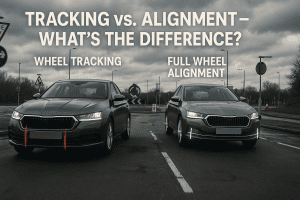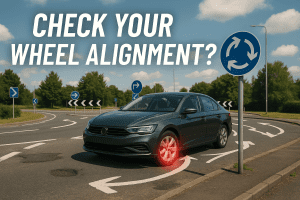Look, I’ll be straight with you I’ve lost count of how many times someone’s rolled up to our garage with their dashboard looking like Blackpool illuminations, asking “Is it serious?” Usually while their car’s making noises that would wake the dead.
Just last week, a woman came in panicking because her engine light had been on for three months. Three months! She’d been driving around MK’s mental roundabout system with her fingers crossed, hoping it would magically sort itself out. Spoiler alert: it didn’t.
Here’s the thing about living in Milton Keynes your car gets a proper workout. All that stop-start traffic crawling past IKEA, bombing round 130-odd roundabouts daily, navigating roadworks that seem to multiply faster than rabbits, and dodging potholes that could probably qualify for their own council tax band. Your motor’s working hard, and sometimes it needs to tell you something’s not right.
That’s where diagnostic checks come in. Think of it as your car having a proper chat with us about what’s bothering it, instead of just flashing lights at you like some sort of automotive morse code.
What’s All This Diagnostic Stuff About Then?
Right, here’s the deal. Your car isn’t just an engine with wheels anymore – it’s basically a computer that happens to drive. Every motor built after 1996 has what’s called an OBD system (that’s On-Board Diagnostics if you’re interested, but don’t worry about remembering that).
Basically, your car’s got its own little brain that keeps track of everything that’s happening under the bonnet. When something goes wonky – maybe a sensor’s having a bad day or your emissions are playing up – the car makes a note of it using special codes. It’s like your motor keeping a diary of all its problems.
When you bring your car to us at MK12 Auto Care, we plug our kit straight into your car’s computer and have a proper conversation with it. Within minutes, we can see what’s been going wrong, what might go wrong, and whether there are problems lurking that haven’t even triggered warning lights yet.
According to the Institute of the Motor Industry, modern vehicles can have up to 150 different electronic control units. That’s a lot of potential for things to go sideways, which is exactly why diagnostic checks are so important.
Top 5 Signs You Need a Diagnostic Check
1. Warning Lights on the Dashboard
This one’s a no-brainer, but you’d be gobsmacked how many people just stick a bit of tape over the warning light and carry on. I’ve actually seen someone do this. With electrical tape. I nearly cried.
Those little symbols aren’t there for decoration they’re your early warning system. The most common culprits are the check engine light (looks suspiciously like an engine), the ABS light, and the airbag warning. Some folks think if the car’s still moving, everything’s fine. It’s not. These lights often show up before you notice any actual problems, which means we can fix things before they get expensive.
2. Unusual Engine Noises
Your engine should sound smooth and content, not like it’s having a domestic with the gearbox. If you’re hearing knocking, rattling, clicking, or your car sounds like a bag of bolts when it’s idling, that’s your cue to book in.
These noises often mean sensors are playing up, fuel injection’s gone wonky, or there’s something amiss with the ignition. The RAC’s breakdown statistics show that engine-related failures account for about 15% of all callouts – and most of those started with “funny noises” that got ignored.
3. Reduced Fuel Efficiency
Have you noticed you’re practically living at the petrol station lately? With fuel costing what it does these days, this one hurts the wallet as much as anything else. If your normally sensible motor is suddenly drinking petrol like it’s going out of fashion, something’s definitely up.
Poor fuel economy can be down to faulty oxygen sensors, clogged fuel injectors, or your car’s computer getting confused about the fuel-air mixture. A diagnostic check will tell us exactly what’s making your car so thirsty.
3. Strange Vibrations or Jerking When Driving
Look, MK’s roads aren’t exactly billiard-table smooth, but you should still be able to tell the difference between normal bumps and your car having a wobble. If you’re getting weird vibrations through the steering wheel, or your motor’s jerking and hesitating when you put your foot down, it’s diagnostic time.
These symptoms often point to gearbox issues, dodgy sensors, or problems with electronic systems. Trust me, catching gearbox problems early can save you thousands I’ve seen repair bills that would make your eyes water.
5. Difficulty Starting or Stalling
If your car’s started being awkward about starting in the mornings, or worse, cutting out randomly while you’re driving, don’t ignore it. This is especially common if you’re doing lots of short trips around MK, which let’s face it, most of us are.
Starting problems and random stalling can be anything from battery issues to faulty sensors, fuel system problems, or ignition faults. The AA’s technical reports show that starting problems are among the top three reasons for breakdown callouts in urban areas like ours.
Why Milton Keynes Drivers Can’t Afford to Ignore These Signs
Our lovely city puts your car through the wringer in ways you might not even realise. Think about your typical day short trips to Tesco, sitting in traffic jams around the centre, endless roundabouts, roadworks on Watling Street again, dodging crater-sized potholes that appear overnight.
All this stop-start driving is murder on electronic components. Your car never really gets properly warmed up, sensors don’t work at their ideal temperature, and constant acceleration and deceleration around roundabouts wears things out faster.
Research from Cranfield University (practically on our doorstep) shows that urban driving conditions like ours can cause electronic system failures up to 35% more frequently than steady motorway driving. Factor in our special relationship with potholes, and you’ve got a recipe for sensors and components getting knocked about.
Here’s the killer bit a faulty oxygen sensor might cost £60 to replace now, but ignore it and it could knacker your catalytic converter. That’s an £800+ repair bill right there. I’ve had to deliver that news to customers, and it’s not fun for anyone.
What Happens During a Diagnostic Check at MK12 Auto Care
No need to worry about being blinded by science when you come to see us. Here’s exactly what we do:
First, we’ll have a proper chat about what you’ve noticed – when it started, what symptoms you’re getting, that sort of thing. Then we connect our diagnostic scanner to your car’s OBD port (it’s usually somewhere under the dashboard).
The scanner basically has a conversation with your car’s computer and downloads all the fault codes it’s been storing. Think of it as reading your car’s medical records. Within about 15-20 minutes, we’ll have a complete picture of what’s going on.
Here’s the important bit we explain everything in plain English. None of this “P0420 catalyst system efficiency below threshold” nonsense without telling you what it actually means for you and your wallet. If we find problems, we’ll talk you through what needs fixing, how urgent it is, and give you an honest quote with no hidden surprises.
Don’t Be That Person Who Ignores the Warning Signs
I see it all the time people driving around with warning lights on, strange noises coming from under the bonnet, or cars that are clearly struggling. They’re always hoping it’ll sort itself out or that it’s “probably nothing serious.”
Here’s the brutal truth: car problems almost never get better on their own. They get worse, and they get expensive fast. That little amber light isn’t going to give up and go away it’s trying to save you money by warning you early.
Spotted a warning light or something just doesn’t feel right? Book your vehicle diagnostic check with MK12 Auto Care today. We’ll get to the bottom of what’s wrong quickly and honestly, with no technical mumbo-jumbo or pushy sales tactics.
Give us a ring or pop in for a chat. Your car’s trying to tell you something important let’s find out what it is before it becomes a much bigger (and more expensive) problem. After all, a £50 diagnostic check today could save you £500 in repairs tomorrow.






